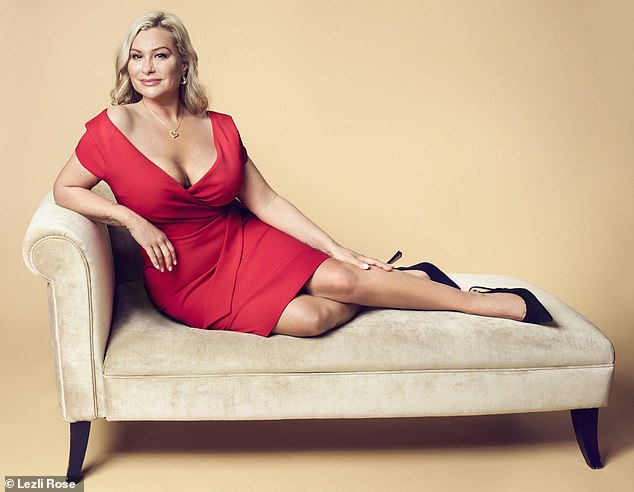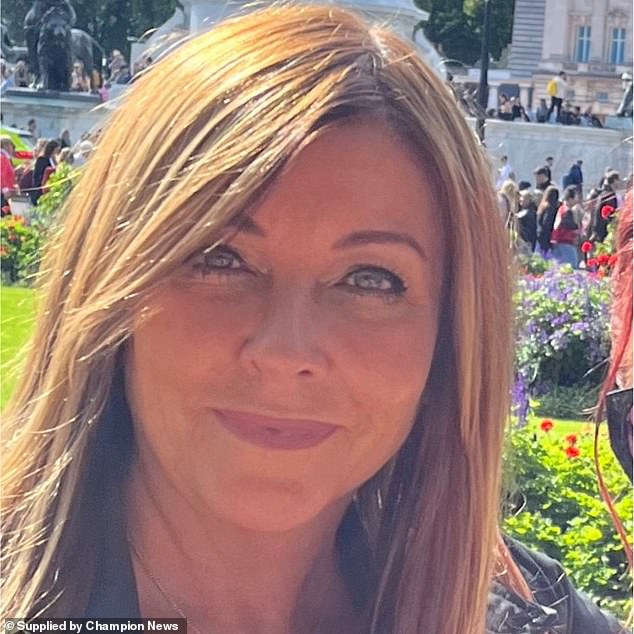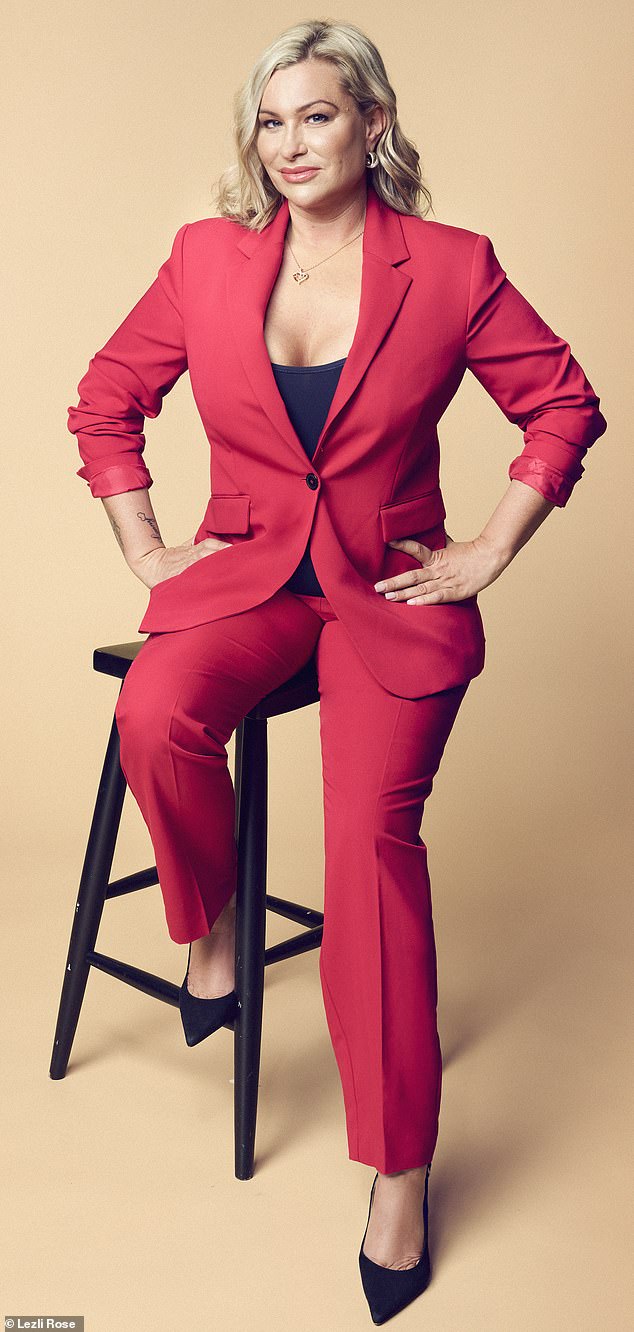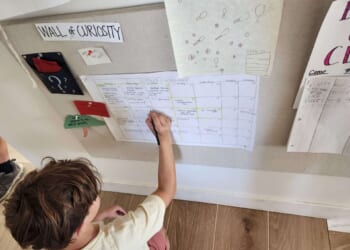Early one morning in March 2020, beautician Jenna Howe received a grim phone call from a friend: ‘Jenna, there’s been an accident,’ he said. She asked what he meant and was told that her father had fallen from a second floor window and died.
‘It was the most horrible, traumatic thing I’ve ever been through in my life,’ she recalls.
Worse perhaps were the complex feelings of guilt and anger. For the 38-year-old mother-of-two had been estranged from her father Roger Howe – an entrepreneur who had made his fortune setting up a series of pirate radio stations before launching a successful tech business – for a full eight years.
At the time of his death no reconciliation had happened, no apologies were ever uttered – and Jenna felt strongly that she deserved one.
Roger, she says, had belittled her constantly from childhood, frequently taunting her and calling her fat. As a result, she had developed bulimia and severe body dysmorphia by the age of just 13.
Breaking contact had not been an easy decision but, when she became pregnant with her first child, she thought that to protect her mental health it would be best to cut her father from her life until she felt strong enough to cope.
Despite the rift, what came next was a further blow. In his £1.5 million will, Roger had made no provision for her, his only child.
Instead, he left his fortune to his 86-year-old mum Rosina, his sister, former dental nurse Tina Tucker, 57, and Tina’s two sons, Ross and Jamie.

Jenna’s fight ended in partial victory when she was awarded £125,000 from the estate, including one extraordinary special provision – £2,000 towards implants to replace the breast augmentation she had at 19
And so began one of the most extraordinary and toxic family legal battles of recent years.
Using a relatively unknown 1975 law which allows individuals to claim reasonable financial provision from a deceased person’s estate if the will or intestacy law fails to provide adequately, Jenna took her father’s relatives – who insisted she ‘didn’t deserve a penny’ – to court.
She was suing them for a third of his wealth, insisting her life had been overshadowed by her father’s callous neglect and cruelty during her childhood.
Last month, her fight ended in partial victory when Judge Mark Raeside KC awarded her £125,000 from the estate, including one extraordinary special provision – a specific £2,000 to go towards paying for implants to replace the breast augmentation surgery she’d undergone aged 19.
It was a rare, formal acknowledgment of the devastating consequences her father’s endless criticism had had on his daughter’s life – and is believed to be one of the few times that a judge has cited cosmetic surgery within their decision.
It is why Jenna was dismayed by subsequent news headlines labelling her a vain and money-grabbing ‘boob job’ heiress.
‘This wasn’t about breast implants, but about setting something right,’ she says.
‘I’ve battled so many body issues which have affected my whole life, and a lot of that is down to my dad.

Jenna’s relationship with her ‘genius’ father, who had built his own transistor radio aged just eight and was by then already a key player in the urban pirate and independent radio scene, was erratic
‘The way he treated me has shaped how I see myself and left me with a legacy of issues that will probably never go away and for which I need help. My father’s words and actions have stuck with me for ever.’
Perhaps unsurprisingly, the court battle has caused an irreparable split in the Howe family, between Jenna and her paternal grandmother Rosina, aunt Tina and her cousins. ‘It’s sad, because there’s more than enough money there for everyone,’ Jenna says.
‘I feel bad for them that they didn’t want me and my children in their lives because that is the last part of my dad.’
But then there is so much sadness in this story – all of it evident when I meet with the fragile and clearly still not very confident Jenna.
While blonde and attractive, her nerves shine through and her eyes frequently well up when she recalls the unhappy circumstances that plagued much of her upbringing.
Born in south London in April 1987, Jenna’s parents – dad Roger and mum Nicky – divorced when she was two.
From that moment, her relationship with her ‘genius’ father, who had built his own transistor radio aged just eight and was by then already a key player in the urban pirate and independent radio scene, was erratic.
Despite being ordered by a court to pay maintenance, Roger paid nothing towards her upkeep and would often not turn up for his arranged visits to see Jenna at his mother Rosina’s house.

Tina Tucker, Roger’s former dental nurse who he left much of his fortune to
‘With the pirate radio scene also comes the party lifestyle,’ says Jenna. ‘They’re involved in clubs and drugs. So he wasn’t the most reliable father figure and, even when he showed up, you would never know what sort of mood he would be in.’
Jenna recalls her father frequently belittling her mum on the few occasions when she saw them together – and it was not long before the jibes turned her way.
‘From me being little, he’d go on about how I was a bit chubby,’ she recalls. ‘I think he was embarrassed by me from early on.’
He told her she was ‘too fat’ to pursue her dream of becoming a singer and forced her to weigh herself in front of a friend when she was just eight.
‘He was always laughing at me, telling me to get to the gym,’ she says. ‘I’d walk into a room, and he’d make a snide remark about what I was wearing, that it wasn’t for my build. Whenever I had a meal with him he’d roll his eyes if I got an extra potato. The worst thing is I was never overweight in the first place.’
The cumulative effects were devastating: records submitted to Central London County Court show Jenna was assessed by social services for ’emotional difficulties’ when she was only five.
By the age of 13 she had developed bulimia which for periods was so severe, she couldn’t attend school. When she did, she was bullied as ‘the fat kid’. ‘It felt like I was never good enough.
‘I was actually very slim, but my dad had put it in my brain that I was overweight. I was constantly comparing myself to the other girls at school.’
It meant that, within a year of her bulimia starting, she began to self-harm. ‘Looking back, I was desperate to be thin and please my dad.’
Jenna’s mother often appealed to Roger for support, but he didn’t provide any. (Jenna’s medical records describe him variously as being ‘not tactful re. J’s needs’ and ‘a disciplinarian’.)
Desperate to win her father’s approval, an underage Jenna readily accompanied him on trips to nightclubs whenever he asked – a decision that also exposed her to drink and drugs.
By 15, having dropped out of school with no qualifications, she was a regular user of cocaine.
‘While I was taking drugs I wasn’t hungry, so it was also a way of staying thin. I felt boys would only like me if I was slim, not for who I was,’ she says.
Struggling with poor body image, by 19 Jenna decided to get breast implants to, as she puts it, ‘help me feel better about myself’.
‘A lot of the girls who were around my dad had cosmetic surgery, and it played on my already deep insecurities,’ she says. ‘It was another element of feeling not good enough. I just wanted to fit in.’
It was a decision that quickly became mired in regret. ‘No amount of surgery was going to change how I felt inside,’ she says.
The turning point for Jenna came when, in 2011 and now with a partner, she discovered that she was pregnant.
Determined to have a fresh start for her unborn child, she cut off contact with her father after realising that the stress she felt when seeing him could potentially affect her pregnancy.
Nonetheless, once Jenna’s daughter (whom she has asked not to name) was born in March 2012, she held out an olive branch, hoping her father would want to meet his first grandchild. ‘I never heard back from him,’ she says.
It was the same story when her second child, a boy, was born in October 2018. ‘I had to accept he wasn’t interested,’ she says.
‘It wasn’t nice, but it was how he was.’ During those years, Jenna tried her best to rebuild her life, training as a beautician. But when, in 2019, her daughter expressed an interest in meeting the grandfather she’d never seen, she tried once again to rekindle relations with him.
‘I sent a text message to his sister Tina saying my daughter was curious about him and wanted to meet,’ she says. ‘She replied saying it wasn’t a good time.’
Just a few months later, Jenna then received that unexpected phone call informing her of her dad’s accident – his fall from the second floor flat of his London apartment block. His death was subsequently the subject of a coroner’s investigation in which an open verdict was recorded.
After absorbing the news, Jenna’s first thought was to call Tina. ‘Obviously she was stunned, but she said she had seen him recently and he had said he wanted to reconnect with me.’
Indeed, in a WhatsApp message sent shortly after Roger had died, Tina tried to reassure her niece that she had done her best.
‘He was a very difficult person with a bad habit of pushing people away,’ she wrote. ‘He knew you wanted to get in contact.’
The words gave Jenna a sliver of comfort, as did the fact she was able to read a poem at her father’s funeral. Roger was also buried with a photo of Jenna in his coffin.
‘I knew he always had stuff going on, but I thought ultimately he could and would have been part of me and the kids’ lives,’ she recalls. ‘It absolutely broke me.’
Fragile at best, it led to her sliding into what she calls a ‘complete mental health breakdown’, during which time she started to bombard Tina with increasingly incoherent messages including suggestions that her father’s death wasn’t an accident.
By the end of July, she had been referred to psychiatric services, and went on to receive a conviction for harassment without violence towards Tina, for which she was fined £300.

‘I cried my eyes out, because it meant I’d been listened to,’ says Jenna. ‘I just feel it would really help with my life. So I’m happy with what I’ve got’
‘I’m not proud of what happened, but it was against a backdrop of a complete unravelling,’ she says. ‘I just couldn’t accept what had happened.’
That sentiment extended to her father’s will.
Jenna’s initial attempts to contest it on technicalities were struck out, and so began a three-year legal battle, hinging on the 1975 Inheritance (Provision for Family and Dependants) Act.
‘You’re not saying the will isn’t valid as a document,’ Jenna’s solicitor, Andrew Bishop from Rothley Law, explains. ‘What you’re arguing over is whether it gives you reasonable provision.
‘You’re saying that it doesn’t make provision for me, and if that’s considered unreasonable by a judge, the judge can then effectively change the distribution of the will to make provision.’
The case arrived at the Central Criminal Court in London in January for a five-day hearing, during which Jenna had to come face-to-face with her estranged family.
During the case, an expert testified to Jenna’s extensive medical issues, while her mother also testified to the ‘devastating’ legacy her father’s comments had had on her daughter’s life.
Tina, who was contesting Jenna’s claim, also admitted that the relationship between father and daughter was ‘quite toxic’. ‘He didn’t like her. Roger wasn’t involved that much in her life and had chosen to walk away,’ Tina said.
Either way, in his ruling, Judge Raeside showed huge sympathy for Jenna’s situation, awarding her £125,000, which will be paid into an independently managed trust fund and is designed to cover a £75 weekly maintenance payment for the next decade, assistance in clearing her debts, money for therapy – and £2,000 towards the replacement of her breast implants.
‘She is only just getting by and has a right to maintenance,’ the judge said. ‘This is a case where she wishes to improve herself and this will no doubt help.’
While some distance short of the £435,000 she’d sought – with which she had hoped to buy a house – Jenna says the ruling meant the world to her.
‘I cried my eyes out, because it meant I’d been listened to,’ she says. ‘I just feel it would really help with my life. So I’m happy with what I’ve got.’ She is hoping to undertake the breast implant surgery shortly, largely to eliminate back pain.
‘I will never get my self-confidence back, but undergoing this surgery will just help me feel better overall.’ It is, of course, highly unusual for a judge to make provision for breast surgery in such a judgment – but then, so much about this sorry family drama is unusual.
For all that, today Jenna is keen to try to focus on some positive memories of her past. ‘I try to remember the good things about my dad and the legacy he created,’ says Jenna who, despite everything, admits she still loves him.
‘At the end of the day he was my dad, wasn’t he?’







